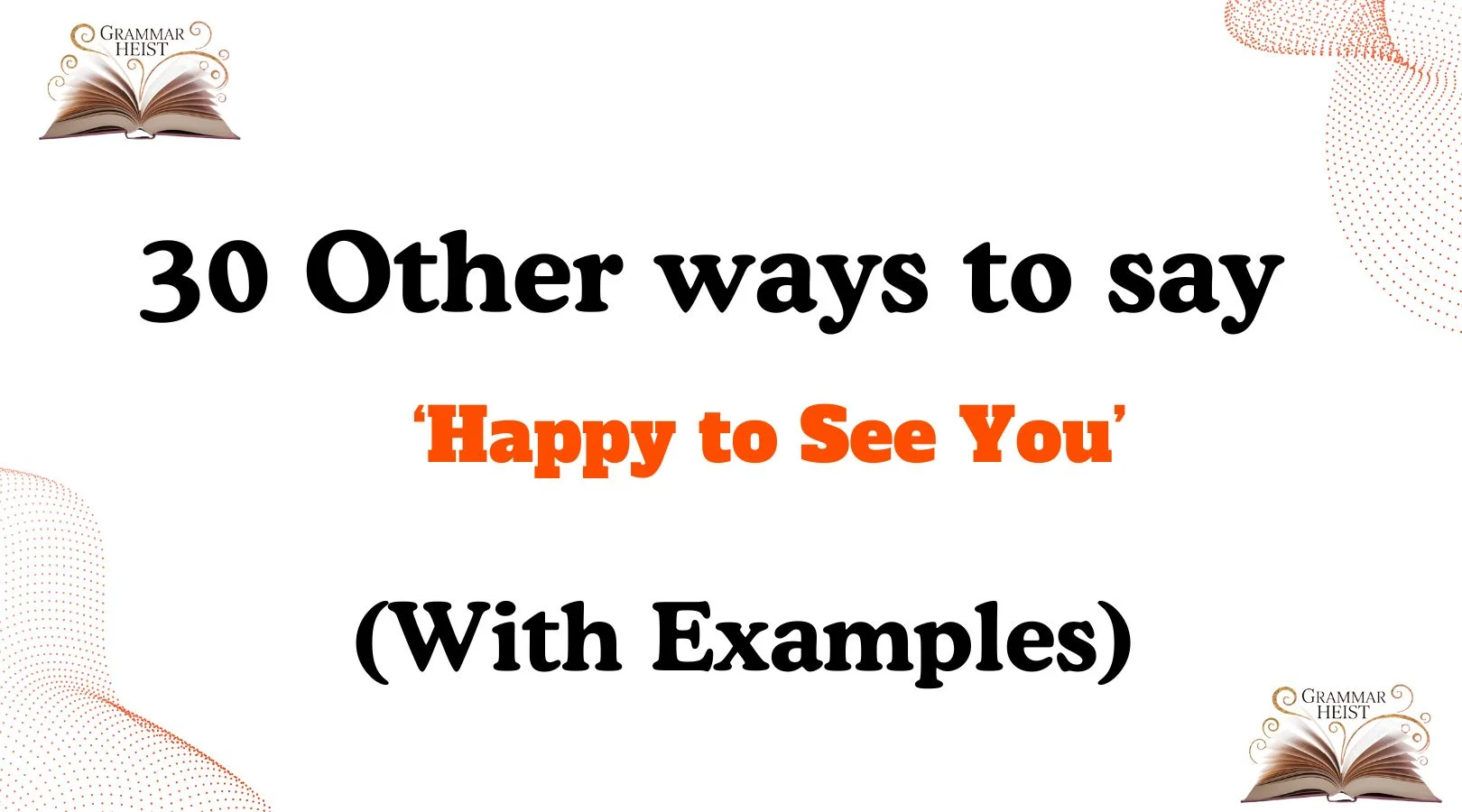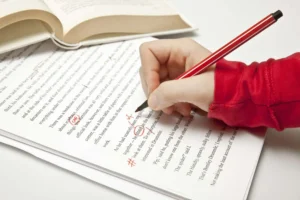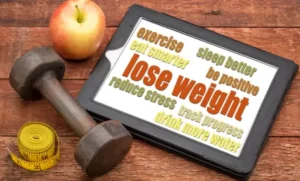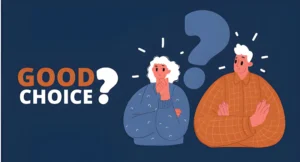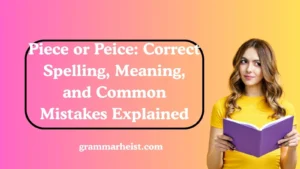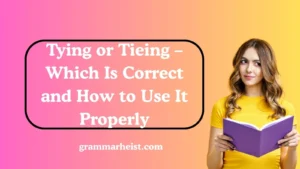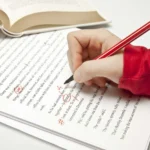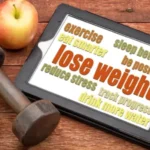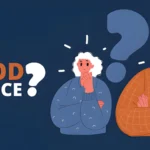When we meet someone we truly care about, the simple phrase “Happy to see you” can warm their heart. But sometimes, using different ways to say “Happy to see you” can make your message feel more personal, thoughtful, and unique. Whether it’s greeting a friend, welcoming a colleague, or meeting someone special, the right words can help express genuine warmth, appreciation, and joy.
Below, you’ll discover 30 meaningful alternatives that you can use to express the same feeling in various ways.
What Does “Happy to See You” Mean?
Saying “Happy to see you” is a warm and friendly way to express joy and appreciation when meeting someone. It communicates that their presence brings positivity, comfort, or excitement. This phrase can be used both in personal and professional situations to show that someone matters to you.
Is It Professional/Polite to Say “Happy to See You”?
Yes, it is both polite and professional to say “Happy to see you” in the right context. For example:
- When greeting colleagues after time apart.
- During formal meetings or networking events.
- When welcoming clients or guests.
It shows warmth without being too casual, making it a perfect balance between friendliness and professionalism.
Pros and Cons of Saying “Happy to See You”
Pros:
- Creates a warm and positive atmosphere.
- Strengthens emotional connections.
- Appropriate for both casual and formal settings.
Cons:
- Repetition can make it sound less sincere over time.
- May seem too simple in emotional or special moments.
This is why knowing alternatives can help you make your expression more meaningful and natural.
Synonyms For “Happy to See You”
- Great to see you
- So good to see you
- Lovely to see you
- It’s wonderful to see you
- I’ve missed you
- I’m thrilled to see you
- So nice to see you again
- Delighted to see you
- Always a pleasure to see you
- It’s a joy to see you
- You made my day
- I’m really glad to see you
- It’s been too long
- I was looking forward to seeing you
- It’s so refreshing to see you
- What a nice surprise to see you
- I couldn’t be happier to see you
- I’m grateful to see you
- It warms my heart to see you
- You brighten up my day
- What a pleasure to see you
- So happy to have you here
- You’re a sight for sore eyes
- I’m overjoyed to see you
- You always make everything better
- I love seeing you
- I feel lucky to see you
- I’m so glad you’re here
- It feels good to see you
- You bring joy with you
1. Great to see you
Scenario: When greeting someone warmly after not seeing them for a while.
Examples:
- “Great to see you again after so long!”
- “Great to see you, I’ve missed our talks.”
- “Wow, great to see you! You look amazing.”
Tone: Friendly and genuine.
Explanation: This is a classic and versatile alternative that shows sincere happiness in a casual or professional setting.
2. So good to see you
Scenario: When you want to express gentle warmth and closeness.
Examples:
- “So good to see you, it’s been too long.”
- “Honestly, so good to see you again.”
- “It’s so good to see you, you always bring good energy.”
Tone: Warm and heartfelt.
Explanation: Ideal for close friends, family, or colleagues you’re comfortable with.
3. Lovely to see you
Scenario: When you want to sound polite and kind, often in a professional or semi-formal setting.
Examples:
- “Lovely to see you today.”
- “Lovely to see you again, how have you been?”
- “It’s lovely to see you after such a long time.”
Tone: Polite and elegant.
Explanation: This phrase feels gracious and refined, perfect for formal greetings.
4. It’s wonderful to see you
Scenario: When you want to show enthusiasm and kindness.
Examples:
- “It’s wonderful to see you again.”
- “It’s wonderful to see you, I’ve missed this energy.”
- “Wow, it’s wonderful to see you today.”
Tone: Joyful and warm.
Explanation: This phrase adds a little extra sparkle to your greeting, ideal for special occasions.
5. I’ve missed you
Scenario: When meeting someone dear after a long time.
Examples:
- “I’ve missed you, it’s so good to finally see you.”
- “Wow, I’ve missed you more than I realized.”
- “I’ve missed you, this moment makes me so happy.”
Tone: Emotional and warm.
Explanation: This shows deep personal affection and connection.
6. I’m thrilled to see you
Scenario: When your excitement is obvious and sincere.
Examples:
- “I’m thrilled to see you today!”
- “Honestly, I’m thrilled to see you again.”
- “I’m thrilled to see you, it’s been way too long.”
Tone: Excited and energetic.
Explanation: A lively and positive expression, great for close friends and celebrations.
7. So nice to see you again
Scenario: When greeting someone after some time apart in a polite way.
Examples:
- “So nice to see you again.”
- “So nice to see you again, how have you been?”
- “So nice to see you again, you’ve been missed.”
Tone: Friendly and polite.
Explanation: Ideal for both professional and personal interactions.
8. Delighted to see you
Scenario: When you want to express genuine pleasure.
Examples:
- “Delighted to see you again.”
- “I’m truly delighted to see you here.”
- “Delighted to see you, you look great.”
Tone: Polished and warm.
Explanation: This works beautifully in formal or elegant settings.
9. Always a pleasure to see you
Scenario: When someone’s presence always makes you happy.
Examples:
- “It’s always a pleasure to see you.”
- “Always a pleasure to see you, my friend.”
- “Always a pleasure to see you, as usual.”
Tone: Warm and sincere.
Explanation: Perfect for expressing consistent appreciation.
10. It’s a joy to see you
Scenario: When your happiness is genuine and heartfelt.
Examples:
- “It’s a joy to see you again.”
- “It’s a joy to see you, I’ve missed this.”
- “Truly, it’s a joy to see you.”
Tone: Cheerful and affectionate.
Explanation: A beautiful way to express pure joy.
11. You made my day
Scenario: When seeing someone instantly lifts your mood.
Examples:
- “Wow, you made my day!”
- “Seeing you here made my day.”
- “You made my day, just by being here.”
Tone: Excited and heartfelt.
Explanation: A casual and personal way to show genuine impact.
12. I’m really glad to see you
Scenario: When expressing honest and calm happiness.
Examples:
- “I’m really glad to see you again.”
- “I’m really glad to see you, it’s been a while.”
- “I’m really glad to see you, my friend.”
Tone: Warm and gentle.
Explanation: This works in almost any situation—friendly or professional.
13. It’s been too long
Scenario: When you meet someone after a long time apart.
Examples:
- “It’s been too long, how have you been?”
- “It’s been too long since we last met.”
- “Wow, it’s been too long.”
Tone: Warm and nostalgic.
Explanation: Highlights how much their presence was missed.
14. I was looking forward to seeing you
Scenario: When you anticipated the meeting with joy.
Examples:
- “I was looking forward to seeing you all week.”
- “I was looking forward to seeing you, and it’s even better than I thought.”
- “I was looking forward to seeing you, truly.”
Tone: Thoughtful and genuine.
Explanation: This shows emotional investment in the moment.
15. It’s so refreshing to see you
Scenario: When their presence brings positivity.
Examples:
- “It’s so refreshing to see you again.”
- “It’s so refreshing to see you, you bring light with you.”
- “Honestly, it’s so refreshing to see you.”
Tone: Light and uplifting.
Explanation: Best for expressing joy and relief.
16. What a nice surprise to see you
Scenario: When you didn’t expect the meeting but are happy.
Examples:
- “What a nice surprise to see you here!”
- “Wow, what a nice surprise to see you today.”
- “What a nice surprise to see you, this made my day.”
Tone: Pleasantly surprised and cheerful.
Explanation: A joyful phrase for unexpected encounters.
17. I couldn’t be happier to see you
Scenario: When your joy is at its peak.
Examples:
- “I couldn’t be happier to see you.”
- “Honestly, I couldn’t be happier to see you today.”
- “I couldn’t be happier to see you, this moment is special.”
Tone: Deeply warm and emotional.
Explanation: Perfect for close relationships and meaningful reunions.
18. I’m grateful to see you
Scenario: When their presence feels like a blessing.
Examples:
- “I’m grateful to see you today.”
- “I’m grateful to see you, it means a lot.”
- “I’m grateful to see you, truly.”
Tone: Humble and warm.
Explanation: Expresses gratitude and emotional depth.
Read More:30 Other Ways to Say “I Look Forward to Meeting You” (With Examples)
19. It warms my heart to see you
Scenario: When their presence touches you deeply.
Examples:
- “It warms my heart to see you again.”
- “It warms my heart to see you, truly.”
- “It warms my heart to see you, this means so much.”
Tone: Tender and emotional.
Explanation: A soft, heartfelt phrase for loved ones.
20. You brighten up my day
Scenario: When they bring positivity with their presence.
Examples:
- “You brighten up my day every time I see you.”
- “You brighten up my day, always.”
- “Seeing you brightens my day instantly.”
Tone: Cheerful and loving.
Explanation: Shows how much their presence means to you.
21. What a pleasure to see you
Scenario: When greeting someone formally or warmly.
Examples:
- “What a pleasure to see you again.”
- “What a pleasure to see you, truly.”
- “What a pleasure to see you here.”
Tone: Formal yet friendly.
Explanation: Great for professional settings and polite interactions.
22. So happy to have you here
Scenario: When you want to warmly welcome someone.
Examples:
- “So happy to have you here today.”
- “So happy to have you here, it means a lot.”
- “We’re so happy to have you here.”
Tone: Welcoming and kind.
Explanation: Often used for guests or special occasions.
23. You’re a sight for sore eyes
Scenario: When someone’s presence is a big relief or joy.
Examples:
- “You’re a sight for sore eyes!”
- “Wow, you’re a sight for sore eyes.”
- “You’re a sight for sore eyes, I missed you.”
Tone: Warm and expressive.
Explanation: A classic idiom to express big joy.
24. I’m overjoyed to see you
Scenario: When you’re extremely happy.
Examples:
- “I’m overjoyed to see you today.”
- “I’m overjoyed to see you, truly.”
- “I’m overjoyed to see you, this means so much.”
Tone: Joyful and intense.
Explanation: Conveys strong, heartfelt emotion.
25. You always make everything better
Scenario: When their presence is comforting.
Examples:
- “You always make everything better when you’re around.”
- “You always make everything better, thank you.”
- “Seeing you always makes things better.”
Tone: Caring and warm.
Explanation: Shows how much their presence impacts you positively.
26. I love seeing you
Scenario: When meeting someone you truly value.
Examples:
- “I love seeing you again.”
- “I love seeing you, it always makes me smile.”
- “Honestly, I love seeing you.”
Tone: Affectionate and sincere.
Explanation: A personal and meaningful expression.
27. I feel lucky to see you
Scenario: When you value their presence deeply.
Examples:
- “I feel lucky to see you today.”
- “I feel lucky to see you, it’s always special.”
- “I feel lucky to see you, truly.”
Tone: Warm and appreciative.
Explanation: Expresses gratitude and affection.
28. I’m so glad you’re here
Scenario: When welcoming someone warmly.
Examples:
- “I’m so glad you’re here, it wouldn’t be the same without you.”
- “I’m so glad you’re here, I’ve missed you.”
- “I’m so glad you’re here, it’s perfect now.”
Tone: Genuine and kind.
Explanation: A natural and comforting phrase.
29. It feels good to see you
Scenario: When the moment feels calming and warm.
Examples:
- “It feels good to see you again.”
- “It feels good to see you, truly.”
- “It feels good to see you, you bring calm.”
Tone: Warm and reflective.
Explanation: A simple way to express comfort.
30. You bring joy with you
Scenario: When someone’s energy always brings happiness.
Examples:
- “You bring joy with you wherever you go.”
- “You bring joy with you, I love that.”
- “You bring joy with you, this room feels brighter.”
Tone: Cheerful and heartfelt.
Explanation: Perfect for close relationships and special moments.
📝 Conclusion
Finding the right words can make a simple greeting much more personal, warm, and meaningful. Instead of saying “Happy to see you” the same way every time, using thoughtful alternatives adds depth, sincerity, and emotion to your message. Whether it’s a friend, family member, coworker, or special guest, these phrases can help you express how much their presence truly matters.

Emma Brooke is a passionate advocate for effective communication and language mastery. As a dedicated professional in the field of grammar and writing, Emma brings a wealth of knowledge and expertise to those seeking to improve their linguistic skills. With a focus on clarity, precision, and style, Emma Brooke is committed to helping individuals refine their language use to communicate confidently and effectively.
